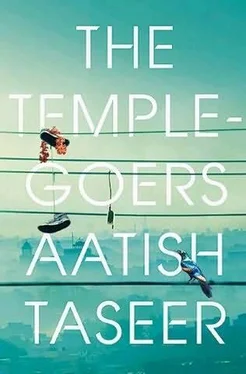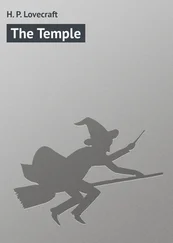But almost as soon as I agreed to the time abroad, our relationship revived. The days that had seemed to run into each other now led up to a final date of departure. The heat that had seemed like a preparation for June’s deathly white skies was now only enervating, somebody else’s problem: Zafar’s, who struggled under it every day, his elegant white umbrella providing hardly any protection from its exquisite blaze. It had made his dark red sores bloom and brighten so that he seemed to sweat blood. The heat was Aakash’s problem, who left home even earlier now to avoid the worst of it. And though he was too vain to ever smell bad, his clothes now emitted the odour of cotton fibres baking in the sun.
Zafar took the news of my departure with gloomy resignation. He would feel the hole my five thousand rupees would leave in his monthly income. He feared that without practice, the Urdu I had learned would slip away from me. Aakash didn’t even entertain the idea that I might be able to stay in shape without him. ‘We’ll have to start again,’ he said, ‘from scratch.’ He was at first curious about my going off to the West and he liked telling the other trainers, but soon his supreme belief that anywhere he wasn’t was of no interest took over. A look of pity entered his eyes every time the subject was brought up. He now spoke of our trip to his village, which was only days away, as if it were a send-off, a final celebration before my months of obscurity began.
I had told Sanyogita about the trip and feared she might react badly. But in her excitement about the summer away, she took it well and in fact became curious herself to meet Aakash again. He in turn said that I wasn’t his client any more, I was his friend, and that it was wrong for me to keep him away from his bhabi. They both seemed in their own ways to be digging at an unspoken desire in me for them not to know each other.
Then, one morning in May, the day before I was to go with Aakash to Haryana, Sanyogita rang while I was in Junglee. Aakash, who always held on to my phone while I worked out, answered it: ‘Hello, bhabi. This is Aakash, sir’s personal trainer…’
This was all I heard. I was unable to move and could only see Aakash drift off to the far end of the room. He stood under the dark plywood cornices, red light falling on him, chatting away happily. When he returned, he said, ‘Plan is set. We’re all going, you, me and bhabi, to Hookah. Man, you’ll love this place. It’s my favourite restaurant. It’s just like in Ali Baba’s time, with tents and platters and apple-flavoured tobacco.’
‘But aren’t we going to the village tomorrow?’
‘Yes, so? We’ll take bhabi’s blessings before going, no?’
I knew the plaza where the restaurant was; I had come to the cinema there many times as a teenager. Fifteen years later, change had not so much come to the plaza as grown over it. It still had its same two- and three-storey pale yellow buildings, with their exposed drainpipes and black water tanks. There was still the cinema’s original structure, low and wide. The plaza was still surfaced with uneven squares of red sandstone. At the centre was a large banyan with a circular cemented base; in the tree’s shade, there were still food sellers, amidst mountains of leaf plates and sprinklings of flies; just near it, a ‘Keep Delhi Green’ dustbin still stained red with pan spittle. And still present among the groups of young men, apparently pulling off a miracle of inconspicuity, were a family of cows. But over this scene, over a portion of the pale yellow buildings, had grown the silver and red façade of a Puma shop with large glass windows. A new company, with gold-lettered branding and multiplexes all over the city, had taken over the old cinema. Its baggy shell had been carved up into smaller, more compact cinemas. The attendants all wore purple and gold uniforms. And where there were slim-limbed, moustached men in dull-coloured polyester trousers, eating from the leaf plates, there were now also groups of young boys, with headphones, gelled hair, black T-shirts and low jeans. It was this group, overweight and dull-eyed, that slipped into the apple-scented shade of Hookah.
The restaurant was arranged on two floors. The street level was virtually empty and the bright afternoon light disturbed its dim ambience. In the windowless basement, lit by spotlight, tents had been set up in alcoves by draping red satiny material over four-legged metal frames whose joints still showed their welding. The floors were of linoleum, the walls brushed gold, and in each alcove there was a gem-encrusted mirror. Boys sprawled on red and gold satin mattresses and bolsters, smoking water pipes and welcoming large brass platters of Middle Eastern food. The girls, their hair blow-dried and their faces made-up, sat primly on chairs. Some sipped bright-coloured drinks, others smoked joylessly. Only their handbags vibrating against their legs quickened their movements, causing them to reach hurriedly for their phones and make fresh plans.
Aakash sat alone at a table. His colour, his physique, his carefully picked clothes, his decorum, made him seem of a race apart from the people around him. And yet he was nothing like the moustached men under the banyan outside. Seeing him in this new environment, selected by him, I had a sense of how much more marginal he was than I had first realized. He had said the restaurant was his favourite, but I had a feeling he hadn’t been there more than a few times.
His eyes brightened when he saw me, then became quiet and respectful at seeing Sanyogita. He seemed nervous, as if welcoming us to his own house. He asked if we’d like to sit in an alcove and yelled ‘excuse me’ in a loud voice; Sanyogita thought it would be better to stay at the table.
‘I thinking the same thing,’ he said in English.
I was worried our conversation would continue in English, but Sanyogita switched to her precise genteel Hindi and Aakash responded with characteristic fluency.
‘Who wants to sit with that tribe of assholes anyway, right?’
Sanyogita laughed with surprise at the use of the word in the context and I sensed her relax. Aakash, as if the formality of the foreign word freed him from all other constraints, yelled for the waiter with another loud ‘excuse me’. The man came over and Aakash ordered beers, hummus, salad, kibbeh. He treated the man with a rudeness that felt experimental, on its way to becoming habitual. The waiter was impervious; when he brought us only two glasses, Aakash said, ‘And my bhabi here? Has she come all the way to look at your face?’
Sanyogita didn’t like this, but tolerated it, as she did the restaurant, perhaps unsure of who should be the true beneficiary of her noblesse oblige.
As is so often the case when two people meet through a third, they inaugurate their new acquaintance by making light fun of the person who brought them together. It was in this vein that Aakash began to mock my gym clothes.
‘Bhabi, I tell him to change those long-sleeved baggy shirts, you know those blue Lacoste or God knows which company’s, but he says he can’t because bhabi likes them.’
We had never had this conversation, but Aakash winked at me to play along. It turned out this was one of Sanyogita’s favourite subjects and the two launched into a happy repartee about my sartorial missteps.
‘I tell him keep them for the house then,’ Aakash said, ‘where bhabi can see them. Please don’t wear them to the gym, where they conceal my hard work.’
‘I hate those T-shirts,’ Sanyogita said disloyally.
‘But bhabi, you have to confess, he is looking better, no?’
‘So much better, unrecognizably better. All this is gone,’ Sanyogita added, pinching my sides.
Aakash noted the physical tenderness between us, and for an instant I saw a cold, unreadable expression on his face. When Sanyogita looked up he was smiling again.
Читать дальше












